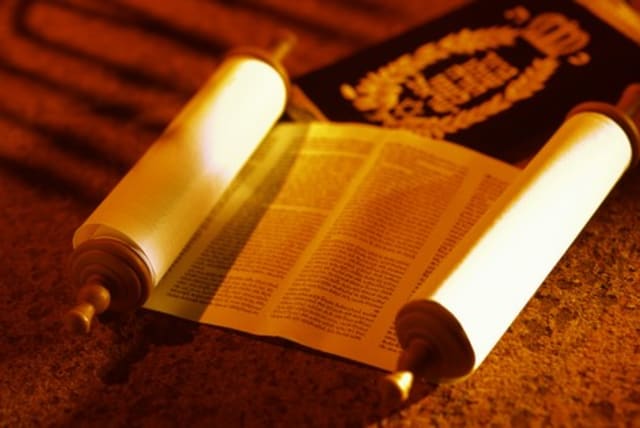This year on Simchat Torah, we need communal conversation about what Torah means to us - opinion

This Simchat Torah, the focus must be on study and discussion of the questions the Torah raises today.
On the evening of Simchat Torah 5784 (October 6, 2023), the last dress rehearsal was held for Kibbutz Nahal Oz's 70th anniversary celebrations. Nahal Oz, established in October 1953, is the closest Israeli community to Gaza City. The kibbutz was preparing to celebrate seven decades of community growth. But instead of celebrating, the kibbutz was attacked. Fifteen members were murdered; seven were abducted and taken into Gaza.
At the same time, in neighboring Kibbutz Kfar Aza, the community was preparing for its annual kite festival, where participants flew kites with messages of peace along the Gaza border. The Kutz family, who organized the event, had their living room full of kites for the festivities. The next day, the entire family – two parents and their three children – were murdered by terrorists who broke into the kibbutz.
Over my six years as rabbi of the Sha'ar HaNegev Regional Council, I have often questioned whether to hold Simchat Torah services in the largely secular kibbutzim. The population’s connection to the Torah is not something they feel the need to celebrate every year. The Hakafot we held in the kibbutzim sometimes felt artificial. Dancing with the Torah among people who had no real relationship with it felt like an empty gesture.
The kibbutz communities have created their own versions of Jewish festivals to reflect their belief in justice, freedom, and creativity. Shavuot celebrates the fruits of their land, and Rosh HaShanah focuses on renewal. On Simchat Torah, the celebration seemed even more distant from traditional observances. Communities found ways to rejoice, but their celebrations focused on communal bonds and connection to the land.
For some secular kibbutzniks, dancing with a Torah scroll can feel uncomfortably religious. The kibbutz movement's founding generations often saw Jewish religious symbols as in tension with their Zionism. Recent generations have also criticized the religious establishment in Israel for acts of injustice carried out in the name of the Torah. Over the years, any Jewish traditions we introduced into kibbutz life had to be done with respect, mediation, and adaptation.
This year, even liberal Jewish communities that have a strong tradition of celebrating Simchat Torah are unsure how to observe the holiday. In the western Negev, there will be no joy on Simchat Torah. The lingering trauma of the October 7 massacre has left people stuck in that moment, as long as hostages remain in Gaza.
But what about the rest of Israel and the Jewish world? Will everyone feel solidarity with the victims of last year’s horrific events? Will some celebrate and dance, despite the pain?
Before we talk about how to celebrate, we must ask: What are we celebrating? What does our connection to the Torah mean?
For me, the pain of the past year as an Israeli Jew is layered. There is grief over the massacre and destruction in the Gaza border communities, anger at the state’s abandonment of these communities, sorrow over the war and its toll, and worry for the hostages. There is also sorrow for the moral corruption in parts of Israeli society, where the Torah is misused to justify a nationalistic and violent identity.
In recent years, the Israeli Reform Movement has made significant progress in promoting gender equality, with egalitarian Hakafot being held publicly. But this year, it’s clear that something more radical is needed. We need a deeper tikkun.
I cautiously suggest a way to demonstrate solidarity and reaffirm our commitment to Reform Jewish values. We should consider renaming Simchat Torah. I have thought about names like "Chag Derishat HaTorah" (Festival of Seeking Torah) or "Leidat HaTorah" (Birth of the Torah), but I eventually landed on "Sichat HaTorah" (Conversation about the Torah). Changing just one letter, but demanding much more from us.
What we need this year
What we need this year is a communal conversation about what the Torah means to us. We must confront its complexities and the difficult messages it contains.
If we truly love the Torah, we must also acknowledge the dangers it presents, particularly in Israel. If we are committed to the Torah, we must struggle with it. We must challenge those parts that glorify war and encourage the sacrifice of human life. At the same time, we must uplift the passages that support peace, justice, and the sanctity of life.
What will Simchat Torah look like? Each community will decide if they will continue to hold services and read from the Torah. But the focus must now be on study and discussion of the difficult questions the Torah raises today. Above all, we must ensure that the Torah remains “a tree of life to those who hold fast to it” (Proverbs 3:18) and that its ways are “ways of pleasantness, and all its paths are peace” (Proverbs 3:17).
We are not obligated to finish this work, but neither are we free to abandon it (Pirkei Avot 2:16).
I wish us all a meaningful holiday and peaceful times ahead.
Rabbi Yael Vurgan, raised in a secular family, is a leader in contemporary Reform Judaism and holds advanced degrees from Hebrew University. Since her ordination in 2018, she has served as the regional rabbi for the Sha'ar HaNegev council, overseeing 10 kibbutzim and playing a crucial role, especially after the events of October 7th.
Jerusalem Post Store
`; document.getElementById("linkPremium").innerHTML = cont; var divWithLink = document.getElementById("premium-link"); if (divWithLink !== null && divWithLink !== 'undefined') { divWithLink.style.border = "solid 1px #cb0f3e"; divWithLink.style.textAlign = "center"; divWithLink.style.marginBottom = "15px"; divWithLink.style.marginTop = "15px"; divWithLink.style.width = "100%"; divWithLink.style.backgroundColor = "#122952"; divWithLink.style.color = "#ffffff"; divWithLink.style.lineHeight = "1.5"; } } (function (v, i) { });

